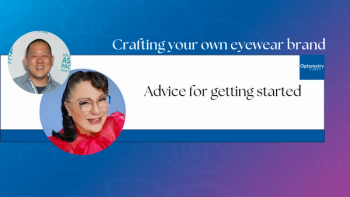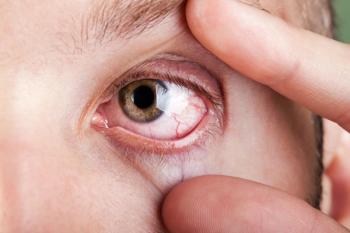
- Vol. 10 No. 9
- Volume 10
- Issue 9
View patients as missed opportunity, not lost cause
It’s easy to get disheartened while trying to create better long-term outcomes for contact lens patients. It’s also easy to blame the patient. However, look at both sides of the problem. First, patients will almost always predict future success according to their past track record. Further, they may not have been properly motivated by another doctor to believe any differently. How can we understand patients better and speak to them in a way that resonates and changes behavior?
One of my favorite articles to write-and apparently to read-was a summation of habits and beliefs reported by random contact lens wearers I connected with during my travels. Recently, in conversation my Wayfair business consultant “Brad” mentioned the he was scheduled for his annual contact lens exam the next day. Brad seemed to be both smart and sensible, so I didn’t want to pass up an opportunity to learn from such a patient. So, I had a few questions for him.
Getting to know BradBrad, where do you get your eye exam and why-is it the technology?
“It’s XYZ Eye. They are ‘real.’ The technology is debatable. They have a puff test and a push-button test that I rock! They have a chart where I read DGFTZ, and they turn the dials. I’ve been there once, she’s cute. I don’t actually like her that much, but she’s super cute, it’s close to work and close to one of my favorite places to eat.”
If there is new technology in contact lenses, do you expect your doctor to tell you? What would your response be?
“Yes! And it depends. I switched a couple years ago, from Oasys to Bausch + Lomb. She said it was a better fit. I have big corneas, so it felt better. But I had lenses in that were two to three weeks old, so of course new ones would feel better!”
Lost cause: Super cute and conveniently located?
Opportunity: Even a cynic wants to know about new things. In the end, it was the fit that convinced him, not the technology. It often takes both. Make the effort to confidently present the technology, but also trial it before assuming anything. Comfort is king. Even if a patient does not complain or realize comfort can be improved, do not hesitate to trial him in a better material if it’s available. After all, it is our job.
Finding out whyWhy do you have an appointment tomorrow?
“I go once a year, whether I need to or not. And I’m getting glasses. I haven’t had any since I was 19 years old. I’m getting progressives.
So why now?
“I’ve been sleeping in my lenses way, way too long-for about five years.”
Is this a “perspective with age” thing?
“No. My friend has some Ray Bans. I tried them on, and I like the way they looked! It would be cool to be outside and see without contacts.”
What about inside?
“They are Transitions.”
Lost cause: No one has been convincing enough to sell him glasses in 24 years. He appears to have intrinsic motivation, and he obtains his technology update from a friend. Don’t discount this, just enhance it.
Opportunity: Deep inside, he wants to take care of himself and do “right.” He believes in the need for yearly eye care, or he believes his prescription is being held hostage; I didn’t have time to ask, but I desperately want to give him the benefit of the doubt. He does have an eye exam every year.
Contact lens safetySo, what is “way, way too long”?
“I sleep in them about four days at a time and keep them two months instead of two weeks.”
What do you think is a safe time and why?
“Three weeks, definitely! No, four weeks.”
Why?
“Because the past is a good predictor of the future. Based on my experience, after three weeks they get a little weird.”
Lost cause: This is our biggest challenge: Past behavior without consequences may be dumb luck instead of a proven track record.
Opportunity: It’s up to ODs to educate patients about the odds of risky behavior.
Contact lens overwearSo, why do you wear them longer? Do you forget, or is it the perception of wastefulness or expense?
“Wasteful, yes. But no, for me it’s laziness. I fall asleep on the couch over and over. Don’t yell at me.”
Why would you say that; do you think it’s wrong?
“No! I don’t. They just want to sell me more contacts to make more money!! Everyone wants to make more money!”
Lost cause: His perspective is there is no consequence to overextending the life or indication for his lenses. Is it his fault, or has no one taught him better?
Opportunity: He says it is laziness, but his deep-rooted cynicism seems to revolve around money. But is it a perspective of not wanting to spend his money, or is it a feeling of being manipulated due to disbelief that there is any risk to his behavior?
Value of visionTell me, Brad, what is your most valued sense?
“Vision. I know what you’re getting at!”
So, you know what you would sacrifice without it then, but what would you be sacrificing to throw your contact lenses away sooner?
(He didn’t answer, but he’s still not convinced).
What do you spend your money on?
“Bills, cars.”
What else?
“Fishing.”
Lost cause: Okay, this is not the approach to reach Brad. He sees it as further manipulation of a vulnerable point because the trust has not been established. (Hopefully, I’m more convincing in person!)
All about the moneySo, what could your doctor say or do to change your perspective?
“I don’t know…maybe after going a few years and knowing it’s not just for her Mercedes. It’s like when ‘they’ say that you have dry eye to try to get you to buy drops! If I’m dry, I’ll yawn or stick my head out the window.”
They have said that?
“Yeah, a couple times. But I’m fine.”
Then why would she say you were dry if you’re not?
“I don’t know; maybe she’s on the take.”
Lost cause: The cynicism is thick here, but perhaps not all is lost.
Opportunity: Brad associates dryness and risk with discomfort, nothing more. The presumed solution is to induce tearing. He perceives a dry eye diagnosis as a momentary problem with a quick solution and no long-term consequence or potential for damage.
Perhaps it’s the nomenclature; “dry eye” seems harmless enough. Perhaps the doctor never mentioned the signs of ocular surface disease. Was it not mentioned, or was it not memorable? Perhaps she determined Brad was asymptomatic and would not adhere to her instructions.
I hear this question from doctors all the time: “How do I get a contact lens patient to do something when he doesn’t feel anything?” (The question that follows is always, “And what about the patient expecting to use her vision insurance, but has signs and symptoms?”)
Show, not tellSo, you’re saying a first-time doc has no chance?
“I don’t know.”
What if she were to show you pictures of your eyes, show you the tear film and what’s actually happening? Would that make a difference?
“Absolutely!” (Brad said this more emphatically than any other word in our conversation.)
Takeaways from Brad
Brad, like many patients, has a built-in cynicism and distrust toward eye doctors. ODs tend to see these behaviors and beliefs more in contact lens patients-but why?
Was it like this before online contact lens retailers convinced them that ODs greedily manipulate and overcharge for lenses? Is it because they feel forced to return yearly, while a non-lens wearer has the (perceived) freedom of choice? Or is it because ODs are telling patients something is wrong-they need a better lens or shorter wear cycle even though they feel fine?
At least we can do something about the last one. We can show them.
I think Brad is moldable. He is on the brink but needs proof to establish trust in the relationship with his doctor. Of course, if you have proof, it’s no longer trust.
Brad has no realization of the possibility of dry eye disease (DED) or ocular surface consequences without symptoms. In his defense, how does an OD build trust within minutes of meeting someone for the first time? I mean the type of trust that induces buy-in to a recommended contact lens brand, wear schedule, and treatment course.
In cases like these, words won’t stick-but pictures will! Use them to create compliance, but more importantly, to build trust.
When trust is established in a population that typically doubts, that patient will be loyal for reasons more compelling than convenience.
There’s an immense amount ODs can learn from a 15-minute conversation with a patient-even someone else’s patient. I recommend ODs conduct these conversations as soon as possible. Learn the beliefs behind what patients do, what ODs do, and how the practice runs.
Sometimes all ODs need are patients willing to have a conversation-and their own willingness to listen to what patients have to say.
Articles in this issue
over 7 years ago
Vision care back in Kentucky Medicaid mixover 7 years ago
Why osmolarity should be the top test for tear film evaluationover 7 years ago
3 strategies to grow your practiceover 7 years ago
5 tips to impress contact lens patientsover 7 years ago
OCT helps diagnose retinoschisis in glaucoma patientsover 7 years ago
Dry eye protocol for any practiceover 7 years ago
When to send your hypertensive patient to the ERover 7 years ago
Highlights of ARVO 2018’s anterior segment postersover 7 years ago
Know the four stages of dry eye blepharitis syndromeNewsletter
Want more insights like this? Subscribe to Optometry Times and get clinical pearls and practice tips delivered straight to your inbox.













































